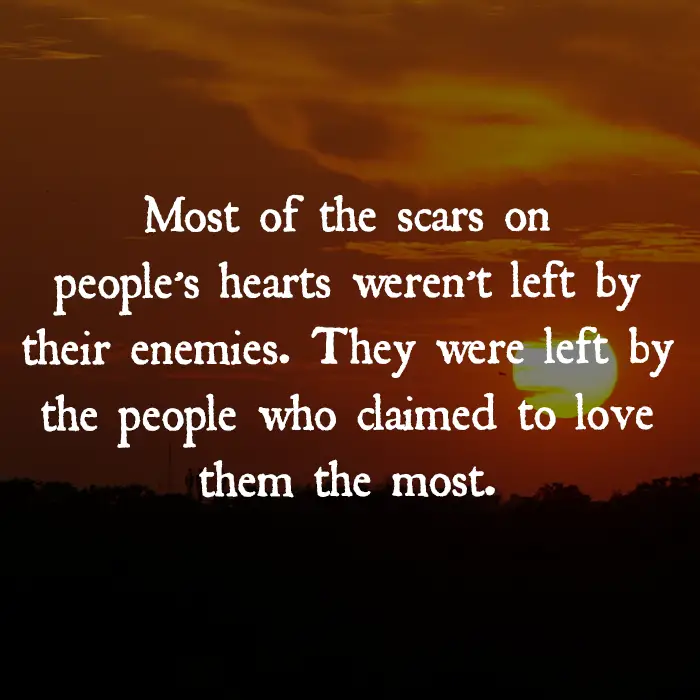
**Understanding the Quote: “Most of the scars on people’s hearts weren’t left by their enemies. They were left by the people who claimed to love them the most.”
This quote highlights the painful reality that the deepest emotional wounds often come from those closest to us. While we expect harm from enemies, betrayal and hurt from loved ones are far more devastating. The people we trust the most have the greatest power to affect us, and when they hurt us, it leaves lasting scars on our hearts.
Why Do Loved Ones Hurt Us the Most?
- Trust and Vulnerability – We open our hearts to those we love, believing they will protect and support us. When they betray or hurt us, the pain is deeper because it shatters that trust.
- Higher Expectations – We expect loyalty, care, and understanding from family members, partners, and close friends. When they fail us, it feels more personal and painful than if a stranger had wronged us.
- Emotional Investment – Love involves deep emotional connections. The closer the relationship, the more intense the hurt when things go wrong.
- Rejection and Abandonment – When someone we love leaves us, ignores us, or chooses to hurt us, it creates emotional scars that take a long time to heal.
Supporting Quotes on Betrayal and Emotional Pain
A quote by William Blake reinforces this idea: “It is easier to forgive an enemy than to forgive a friend.” When someone we consider an enemy hurts us, we may expect it and move on. However, when a friend or loved one causes us pain, it is much harder to forgive and forget.
Another quote by F. Scott Fitzgerald states: “Family means no one gets left behind or forgotten.” Unfortunately, when family members betray or neglect each other, the emotional scars can last a lifetime.
How to Heal from Emotional Scars
- Acknowledge the Pain – Ignoring or suppressing pain only makes it worse. Accepting that you have been hurt is the first step to healing.
- Set Boundaries – If someone repeatedly hurts you, setting boundaries can protect your emotional well-being.
- Seek Closure – Understanding why the hurt happened can help in the healing process. Sometimes, having a conversation with the person who hurt you can bring clarity.
- Forgiveness (When Ready) – Forgiving does not mean forgetting, but it allows you to release the emotional burden and move forward.
- Focus on Self-Love – Surround yourself with people who appreciate and respect you. Engage in activities that bring you joy and peace.
Final Thoughts
This quote serves as a reminder that the deepest wounds often come from those we least expect. While pain from loved ones can be devastating, it is important to focus on healing and not let past hurts define our future. True strength comes from learning, growing, and protecting our hearts while still allowing love to enter our lives.

**Understanding the Quote: “Most of the scars on people’s hearts weren’t left by their enemies. They were left by the people who claimed to love them the most.”
This quote highlights the painful reality that the deepest emotional wounds often come from those closest to us. While we expect harm from enemies, betrayal and hurt from loved ones are far more devastating. The people we trust the most have the greatest power to affect us, and when they hurt us, it leaves lasting scars on our hearts.
Why Do Loved Ones Hurt Us the Most?
- Trust and Vulnerability – We open our hearts to those we love, believing they will protect and support us. When they betray or hurt us, the pain is deeper because it shatters that trust.
- Higher Expectations – We expect loyalty, care, and understanding from family members, partners, and close friends. When they fail us, it feels more personal and painful than if a stranger had wronged us.
- Emotional Investment – Love involves deep emotional connections. The closer the relationship, the more intense the hurt when things go wrong.
- Rejection and Abandonment – When someone we love leaves us, ignores us, or chooses to hurt us, it creates emotional scars that take a long time to heal.
Supporting Quotes on Betrayal and Emotional Pain
A quote by William Blake reinforces this idea: “It is easier to forgive an enemy than to forgive a friend.” When someone we consider an enemy hurts us, we may expect it and move on. However, when a friend or loved one causes us pain, it is much harder to forgive and forget.
Another quote by F. Scott Fitzgerald states: “Family means no one gets left behind or forgotten.” Unfortunately, when family members betray or neglect each other, the emotional scars can last a lifetime.
How to Heal from Emotional Scars
- Acknowledge the Pain – Ignoring or suppressing pain only makes it worse. Accepting that you have been hurt is the first step to healing.
- Set Boundaries – If someone repeatedly hurts you, setting boundaries can protect your emotional well-being.
- Seek Closure – Understanding why the hurt happened can help in the healing process. Sometimes, having a conversation with the person who hurt you can bring clarity.
- Forgiveness (When Ready) – Forgiving does not mean forgetting, but it allows you to release the emotional burden and move forward.
- Focus on Self-Love – Surround yourself with people who appreciate and respect you. Engage in activities that bring you joy and peace.
Final Thoughts
This quote serves as a reminder that the deepest wounds often come from those we least expect. While pain from loved ones can be devastating, it is important to focus on healing and not let past hurts define our future. True strength comes from learning, growing, and protecting our hearts while still allowing love to enter our lives.

